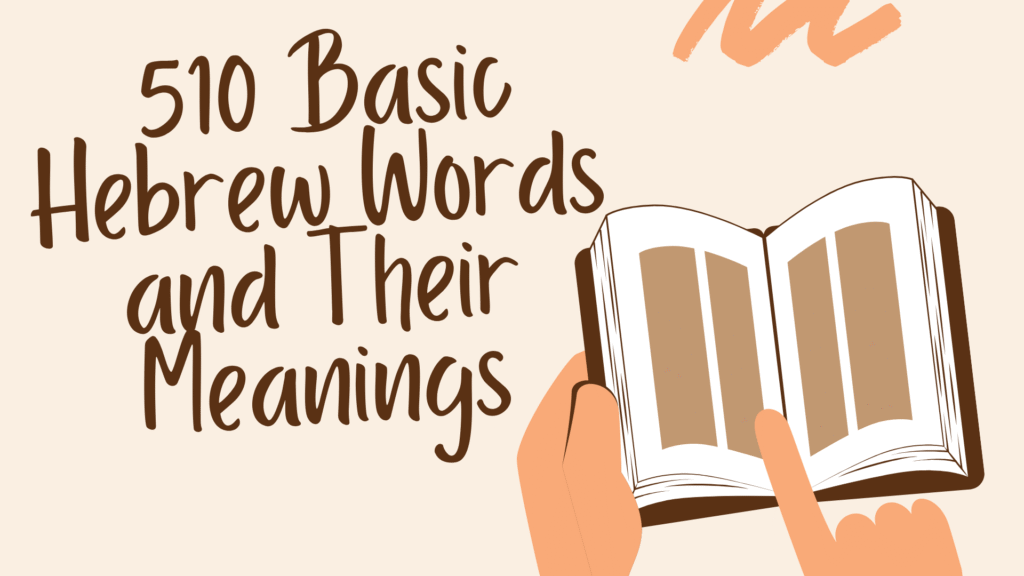Learning Hebrew opens doors to understanding one of the world’s oldest languages, rich with history, culture, and spiritual significance. Whether you’re studying for religious purposes, planning to visit Israel, or simply exploring linguistics, mastering basic Hebrew vocabulary is your first step toward fluency. This comprehensive guide presents 510 essential Hebrew words and their meanings, organized systematically to help you build a solid foundation in this beautiful Semitic language.
Why Learn Basic Hebrew Words?
Hebrew is more than just a language—it’s a gateway to understanding thousands of years of Jewish traditions, biblical translations, and cultural significance. Modern Hebrew serves as the official language of Israel and is spoken by over 9 million people worldwide. By learning these fundamental Hebrew words and phrases, you’ll gain insight into both contemporary Israeli culture and ancient Torah teachings.
The Hebrew language offers unique perspectives on concepts of faith and trust, love and compassion, and righteousness and justice that don’t always translate directly into other languages. Understanding Hebrew meanings in their original context provides deeper appreciation for spiritual concepts and biblical applications.
Understanding Hebrew Language Structure
Hebrew belongs to the Semitic language family and reads from right to left. Unlike English, Hebrew uses a root system where most words derive from three-letter roots that carry core meanings. This system makes Hebrew particularly rich in semantic analysis and linguistic roots.
Transliteration helps English speakers learn Hebrew pronunciation by representing Hebrew sounds using Latin characters. Throughout this guide, we’ll provide both Hebrew script and transliterated forms to support your language learning journey.
Essential Family and Personal Terms in Hebrew
Family relationships form the cornerstone of Hebrew vocabulary. Understanding these terms connects you to the cultural observations and historical context of Hebrew-speaking communities.
Family Members:
- אבא (abba) – dad/father
- אמא (ima) – mom/mother
- אח (ach) – brother
- אחות (achot) – sister
- בן (ben) – son
- בת (bat) – daughter
- בעל (ba’al) – husband
- אישה (isha) – wife
- הורים (horim) – parents
- סבא (saba) – grandfather
- סבתא (savta) – grandmother
- דוד (dod) – uncle
- דודה (doda) – aunt
- בן דוד (ben dod) – cousin
The word Av (אב) meaning father connects to the biblical name Avraham (אַבְרָהָם), showing how Hebrew names often carry deep spiritual interpretations. The concept of family in Hebrew extends beyond blood relations to include the broader community of Yehudi (יהודי) – Jewish people.
Pronouns and Basic Grammar
Hebrew pronouns change based on gender and number, reflecting the language’s grammatical complexity:
Personal Pronouns:
- אני (ani) – I
- אתה (ata) – you (masculine)
- את (at) – you (feminine)
- הוא (hu) – he
- היא (hi) – she
- אנחנו (anachnu) – we
- אתם (atem) – you (masculine plural)
- אתן (aten) – you (feminine plural)
- הם (hem) – they (masculine)
- הן (hen) – they (feminine)
The pronoun Ani (עָנִי) also means “poor” in different contexts, demonstrating how Hebrew meanings can shift based on usage and biblical applications.

Food and Daily Life Vocabulary
Hebrew food vocabulary reflects both ancient Torah teachings and modern Israeli cuisine:
Fruits and Vegetables:
- תפוח (tapuach) – apple
- אבטיח (avatiach) – watermelon
- בננה (banana) – banana
- אננס (ananas) – pineapple
- אפרסק (afarsek) – peach
- אגס (agas) – pear
- דובדבן (duvdevan) – cherry
- לימון (limon) – lemon
- תפוז (tapuz) – orange
- ענבים (anavim) – grapes
- גזר (gezer) – carrot
- בצל (batsal) – onion
- מלפפון (melafefon) – cucumber
- עגבנייה (agvaniya) – tomato
Basic Foods:
- לחם (lechem) – bread
- חלב (chalav) – milk
- ביצה (beitza) – egg
- בשר (basar) – meat
- דג (dag) – fish
- גבינה (gvina) – cheese
- אורז (orez) – rice
- חומוס (chumus) – hummus
- פלאפל (falafel) – falafel
- פיתה (pita) – pita
- שקשוקה (shakshuka) – shakshuka
- שוורמה (shawarma) – shawarma
The word Lechem (לחם) meaning bread carries profound spiritual concepts in Hebrew Bible studies, representing sustenance and divine provision. Similarly, Tzayit (זית) meaning olive connects to themes of peace and prosperity throughout Old Testament narratives.
Colors and Descriptions
Hebrew color vocabulary helps describe the world around us:
Colors:
- אדום (adom) – red
- כחול (kachol) – blue
- ירוק (yarok) – green
- צהוב (tzahov) – yellow
- לבן (lavan) – white
- שחור (shachor) – black
- חום (chum) – brown
- סגול (sagol) – purple
- כתום (katom) – orange
Descriptive Words:
- גדול (gadol) – big
- קטן (katan) – small
- יפה (yafe) – beautiful
- מכוער (mechuar) – ugly
- טוב (tov) – good
- רע (ra) – bad
- חדש (chadash) – new
- ישן (yashan) – old
The word Tov (טוב) meaning “good” appears throughout biblical translations and represents divine approval and blessing, showing how basic Hebrew vocabulary carries deep theological significance.

Time and Calendar Terms
Hebrew time vocabulary connects to both secular and religious observances:
Days of the Week:
- יום ראשון (yom rishon) – Sunday
- יום שני (yom sheni) – Monday
- יום שלישי (yom shlishi) – Tuesday
- יום רביעי (yom revi’i) – Wednesday
- יום חמישי (yom chamishi) – Thursday
- יום שישי (yom shishi) – Friday
- שבת (Shabbat) – Saturday
Time Expressions:
- יום (yom) – day
- לילה (layla) – night
- בוקר (boker) – morning
- ערב (erev) – evening
- צהריים (tzohorayim) – noon
- שעה (sha’a) – hour
- דקה (daka) – minute
- שנייה (shniya) – second
- שבוע (shavua) – week
- חודש (chodesh) – month
- שנה (shana) – year
Shabbat (שבת) represents one of the most important concepts in Jewish traditions, embodying rest, prayer and worship, and family gathering. This weekly observance demonstrates how Hebrew vocabulary intertwines with spiritual interpretations and cultural significance.
Places and Locations
Hebrew location vocabulary helps navigate both Israel and Hebrew-speaking communities:
Buildings and Places:
- בית (bayit) – house
- בית חולים (beit cholim) – hospital
- בית כנסת (Beyt Knesset) – synagogue
- בית מרקחת (beit merkachat) – pharmacy
- בית ספר (beit sefer) – school
- אוניברסיטה (universita) – university
- משרד (misrad) – office
- מלון (malon) – hotel
- מסעדה (mis’ada) – restaurant
- בנק (bank) – bank
- חנות (chanut) – store
- ספרייה (sifriya) – library
- מוזיאון (muzeon) – museum
The term Beyt Knesset (בית-כנסת) literally means “house of gathering” and represents the central role of community in Hebrew culture and worship practices.
Body Parts and Health
Understanding body vocabulary is essential for daily communication and health discussions:
Body Parts:
- ראש (rosh) – head
- עין (ayin) – eye
- אוזן (Ozen) – ear
- אף (af) – nose
- פה (peh) – mouth
- שיניים (shinayim) – teeth
- יד (yad) – hand
- אצבע (etzba) – finger/toe
- רגל (regel) – foot/leg
- בטן (beten) – stomach
- גב (gav) – back
- לב (Lev) – heart
- מוח (moach) – brain
The word Lev (לֵב) meaning heart extends beyond the physical organ to represent the center of emotion, thought, and spiritual concepts in Hebrew Bible studies. This demonstrates the linguistic nuances that make Hebrew particularly rich for spiritual interpretations.
Emotions and States of Being
Hebrew emotional vocabulary provides insight into the psychological and spiritual dimensions of human experience:
Emotional States:
- שמח (same’ach) – happy
- עצוב (atzuv) – sad
- כועס (ko’es) – angry
- עייף (ayef) – tired
- רעב (ra’ev) – hungry
- צמא (tzame) – thirsty
- בריא (bari) – healthy
- חולה (chole) – sick
- מאושר (me’ushar) – blessed/happy
The concept of Ashrey (אַשְׁרֵי) meaning “happy” or “blessed” appears frequently in Psalms and represents a state of divine favor, showing how Hebrew meanings often encompass both emotional and spiritual dimensions.
Numbers and Quantities
Hebrew numbers follow unique patterns and gender agreements:
Basic Numbers:
- אחד (echad) – one
- שניים (shnayim) – two
- שלושה (shlosha) – three
- ארבע (arba) – four
- חמש (chamesh) – five
- שש (shesh) – six
- שבע (sheva) – seven
- שמונה (shmone) – eight
- תשע (tesha) – nine
- עשר (eser) – ten
The number Echad (אֶחָד) meaning “one” carries profound theological significance in Hebrew, representing the unity and uniqueness of God in Jewish traditions and biblical applications.
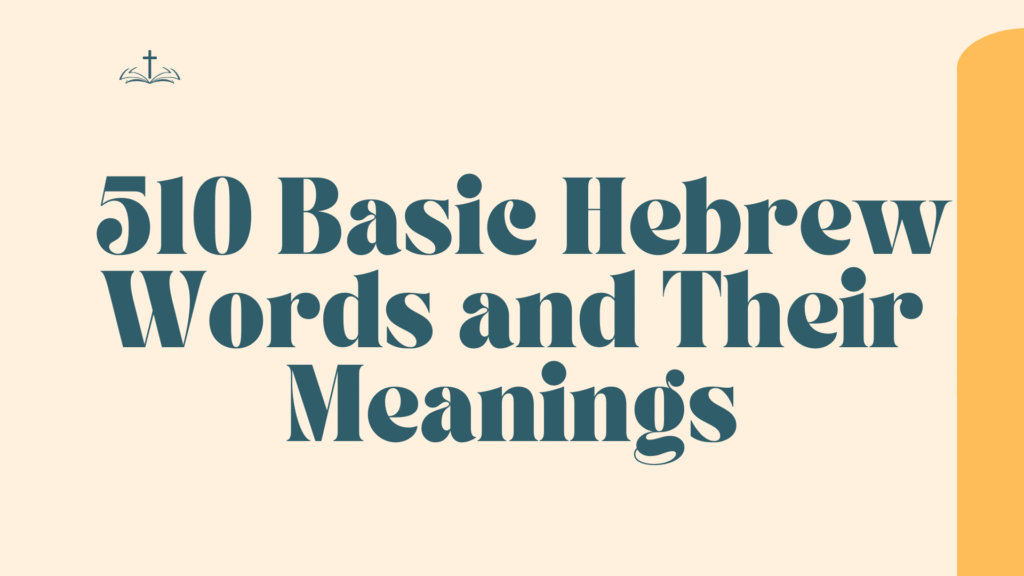
Weather and Seasons
Hebrew weather vocabulary reflects the Mediterranean climate of Israel:
Seasons:
- אביב (aviv) – spring
- קיץ (kayitz) – summer
- סתיו (stav) – fall/autumn
- חורף (choref) – winter
Weather Terms:
- שמש (shemesh) – sun
- ירח (yare’ach) – moon
- כוכב (kochav) – star
- שמיים (Shamayim) – sky/heavens
- ענן (anan) – cloud
- גשם (geshem) – rain
- חם (cham) – hot
- קר (kar) – cold
- רוח (Ruach) – wind
The word Shamayim (שָּׁמיִם) meaning “heavens” represents the dwelling place of the divine in Hebrew Bible studies, while Ruach (רוח) meaning “wind” also signifies “spirit” in spiritual contexts.
Transportation and Travel
Modern Hebrew includes extensive transportation vocabulary:
Transportation:
- מכונית (mechonit) – car
- אוטובוס (autobus) – bus
- מונית (monit) – taxi
- רכבת (rakevet) – train
- מטוס (matos) – airplane
- אופניים (ofanayim) – bicycle
- נמל תעופה (nemal te’ufa) – airport
- תחנה (tachana) – station/stop
Clothing and Personal Items
Hebrew fashion vocabulary covers traditional and modern clothing:
Clothing:
- בגדים (bgadim) – clothes
- חולצה (chultza) – shirt
- מכנסיים (michnasayim) – pants
- מכנסיים קצרים (michnasayim ktzarim) – shorts
- חצאית (chatzait) – skirt
- נעליים (na’alayim) – shoes
- סנדלים (sandalim) – sandals
- גרביים (garbayim) – socks
- כובע (kova) – hat
- חגורה (chagora) – belt
Technology and Modern Life
Contemporary Hebrew incorporates modern technological terms:
Technology:
- מחשב (machshev) – computer
- טלפון (telefon) – telephone
- טלוויזיה (televizya) – television
- מדפסת (madfeset) – printer
- מצלמה (matzlema) – camera
- כספומט (caspomat) – ATM
- מיקרוגל (mikrogal) – microwave
- מזגן (mazgan) – air conditioner
- מקרר (mekarer) – refrigerator
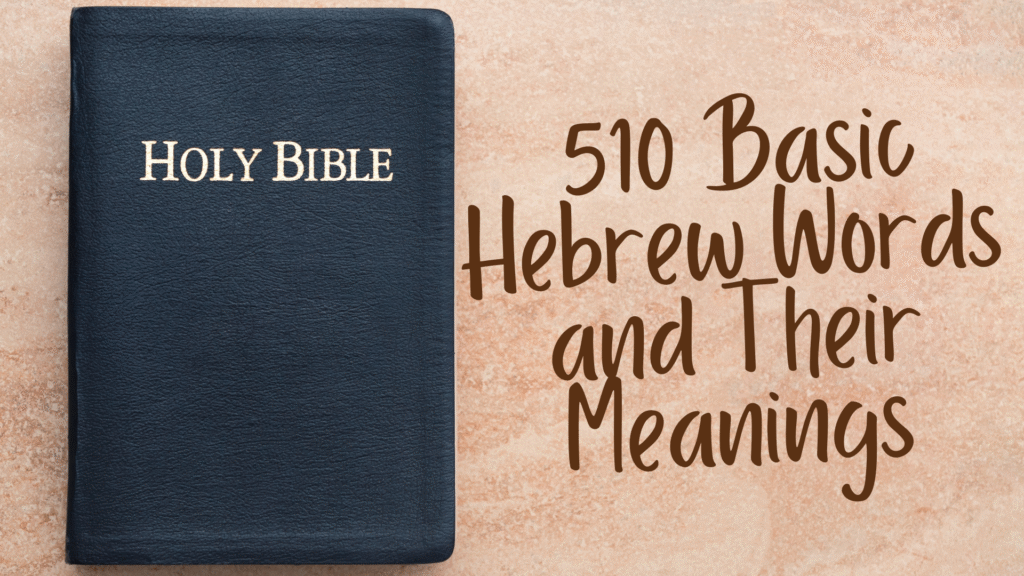
Powerful Hebrew Words
- חיים (Chayim) – Life
- אהבה (Ahavah) – Love
- שלום (Shalom) – Peace
- חופש (Chofesh) – Freedom
- תקווה (Tikvah) – Hope
- אמת (Emet) – Truth
- חוכמה (Chokhmah) – Wisdom
- אמונה (Emunah) – Faith
- גבורה (Gevurah) – Strength
- אחדות (Achdut) – Unity
Deep Dive into Specific Hebrew Word Studies
Words Beginning with ב (Bet)
The letter ב (Bet) represents the concept of “house” or “within” and begins many fundamental Hebrew terms:
Baruch (בָּרוּךְ) meaning “blessed” appears in countless biblical translations and prayer formulations. This word demonstrates how Hebrew blessing language permeates daily life and worship practices.
Betach (בטח) meaning “trust” represents complete confidence and security, often used in spiritual contexts to describe faith and trust in divine providence.
The concept of Beyt Knesset (בית-כנסת) as synagogue literally means “house of gathering,” emphasizing community aspects of Jewish traditions.
Words Beginning with ח (Chet)
The letter ח (Chet) often appears in words related to life, strength, and spiritual concepts:
Chata (חטא) meaning “sin” derives from an archery term meaning “to miss the mark,” providing insight into Hebrew moral and spiritual concepts.
Chavah (חָוָה) meaning “Eve” or “life-giver” connects to the biblical narrative of creation and the role of women in Hebrew tradition.
Chayil (חַיִל) meaning “noble character” appears famously in Proverbs 31 describing the “woman of valor,” demonstrating Hebrew concepts of virtue and strength.
Cheleq (חֵ֫לֶק) meaning “portion” represents one’s allotted share or inheritance, both materially and spiritually.
Words Beginning with ע (Ayin)
The letter ע (Ayin) relates to seeing, knowing, and understanding:
Echad (אֶחָד) meaning “one” forms the foundation of Hebrew monotheistic belief, appearing in the central Jewish prayer, the Shema.
Emunah (אמונה) meaning “faith” represents steadfast belief and trust, particularly in divine faithfulness and reliability.
Eved (עבד) meaning “slave” or “servant” describes the relationship between humans and the divine, emphasizing service and dedication.
Words Beginning with ה (Hey)
The letter ה (Hey) often indicates the definite article and appears in expressions of praise:
Halleluyah (הַלְּלוּיָהּ) meaning “praise the LORD” combines the imperative to praise with the divine name, creating one of the most recognizable Hebrew expressions worldwide.
Hamas (חָמָס) meaning “violence” appears throughout biblical texts describing injustice and oppression, showing how Hebrew addresses social issues.
Hesed (חסד) meaning “love,” “kindness,” or “loyal covenant love” represents one of the most important concepts in Hebrew theology, describing divine character and human relationships.
Hosanna (הושע נא) meaning “save us” demonstrates how Hebrew petition and prayer language expresses human dependence on divine intervention.
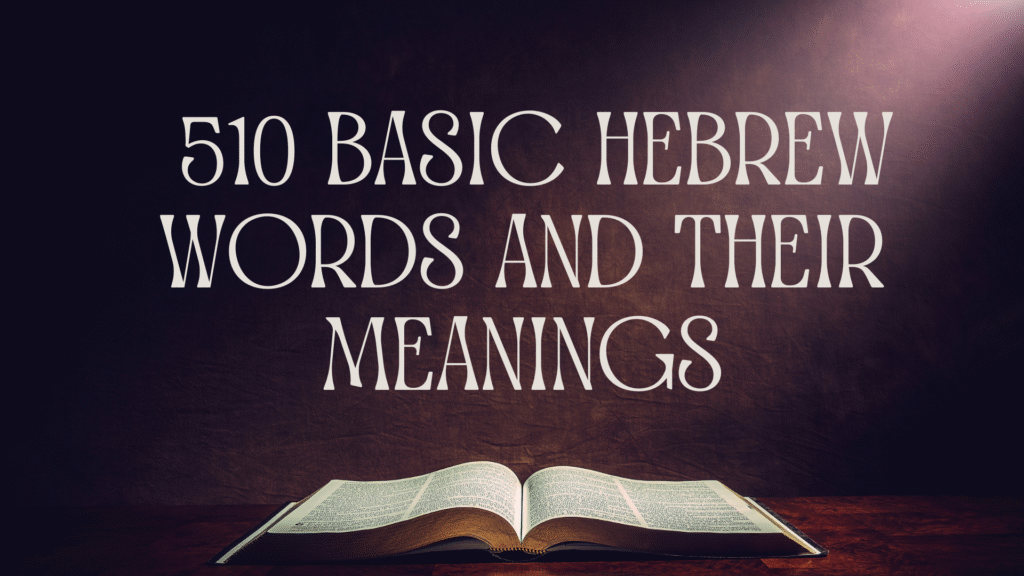
Words Beginning with י (Yud)
The letter ** י** (Yud) appears in many names and concepts related to Jewish identity:
Israel (יִשְׂרָאֵל) meaning “God strives” or “he who wrestles with God” represents both the patriarch Jacob’s new name and the nation descended from him.
Ivrit (עברית) meaning “Hebrew” connects to the patriarch Eber and represents the language of the Hebrew people.
Words Beginning with ל (Lamed)
The letter ל (Lamed) often indicates direction “to” or “for”:
Lechem (לחם) meaning “bread” represents basic sustenance and appears in spiritual contexts representing divine provision and the “bread of life.”
Lev (לֵב) meaning “heart” encompasses not just emotion but also intellect, will, and the center of human personality in Hebrew thought.
Words Beginning with מ (Mem)
The letter מ (Mem) relates to water, chaos, and maternal concepts:
Mem (מם) itself represents primordial waters and chaos, connecting to creation narratives in biblical literature.
Meyah (מעה) meaning “gut” or “intestines” represents the seat of emotions and compassion in Hebrew understanding of human anatomy.
Mi-kha’el (מיכאל) meaning “Michael” or “who is like God” demonstrates how Hebrew names often contain theological questions or statements.
Minchah (מנחה) meaning “offering” represents gifts presented to God, particularly grain offerings in biblical worship.
Words Beginning with נ (Nun)
The letter נ (Nun) relates to life, flourishing, and posterity:
Nahar (נהר) meaning “river” represents life-giving water and appears metaphorically for divine blessing and spiritual refreshment.
Nefesh (נפש) meaning “soul” or “life” represents the living essence of creatures, particularly the breath of life that makes beings alive.
No’ach (נוֹחַ) meaning “resting” connects to Noah and the concept of divine rest and peace after judgment.
Words Beginning with ע (Ayin)
Olam (עולם) meaning “eternal” or “world” represents both temporal eternity and the spatial universe, showing Hebrew concepts of time and space.
Ozen (אוזן) meaning “ear” extends beyond hearing to represent understanding, obedience, and responsiveness to divine communication.
Words Beginning with פ (Peh)
Pardes (פרדס) meaning “paradise” or “orchard” represents the divine garden and ultimate blessing, entering Hebrew from Persian and enriching the language.
Words Beginning with ק (Quf)
The letter ק (Quf) appears in words related to holiness and sanctification:
Qavah (קוה) meaning “hope” represents confident expectation and waiting for divine fulfillment of promises.
Qedem (קדם) meaning “east” connects to the direction of the rising sun and often represents the ancient past or original state.
Words Beginning with ר (Resh)
The letter ר (Resh) relates to seeing, leadership, and beginning:
Ra’ah (רעה) meaning “see” encompasses not just visual perception but also understanding, caring for, and shepherding.
Raphah (רָפָה) meaning “be still” or “let go” represents trust, rest, and ceasing from human effort to allow divine action.
Reh-oo-vane (רְאוּבֵן) meaning “Reuben” literally means “see, a son!” demonstrating the joy and significance of children in Hebrew culture.
Ruach (רוח) meaning “wind,” “breath,” or “spirit” represents the life-giving power of God and the unseen spiritual realm.
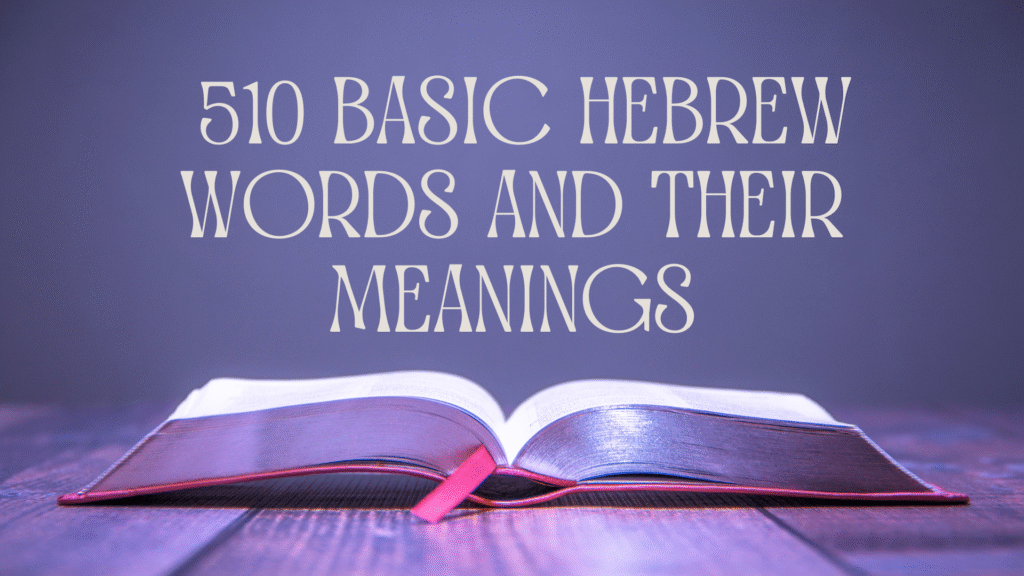
Words Beginning with ש (Shin/Sin)
The letter ש (Shin) relates to fire, destruction, and also peace:
Satan (שָׂטָן) meaning “adversary” or “accuser” represents opposition and testing, originally describing a function rather than a proper name.
Shabbat (שבת) meaning “Sabbath” represents cessation from work and dedication to rest, worship, and spiritual renewal.
Shachah (שָׁחָה) meaning “worship” literally means “to bow down” or “prostrate oneself,” representing humble submission before God.
Shalom aleichem (שָׁלוֹם עֲלֵיכֶם) meaning “peace be upon you” serves as both greeting and blessing, emphasizing the importance of peace in Hebrew culture.
Shemen (שמן) meaning “oil” represents anointing, consecration, and divine blessing, particularly in the context of kings, priests, and prophets.
Shamayim (שָּׁמיִם) meaning “heavens” represents the dwelling place of God and the spiritual realm beyond physical existence.
Shem (שם) meaning “name” carries profound significance in Hebrew thought, representing character, reputation, and essence rather than mere labels.
Shim’on (שמעון) meaning “Simeon” derives from “hearing,” representing attentiveness and responsiveness to divine communication.
Shofar (שופר) meaning “trumpet” represents the ram’s horn used in Jewish religious ceremonies, particularly during the High Holy Days.
Sholeach (שולח) meaning “apostle” or “sent one” represents divine commission and authority to act on behalf of the sender.
Shorashim (שורשים) meaning “roots” represents foundational principles, ancestry, and the deep connections that give life and stability.
Shuv (שוב) meaning “turn back” or “repent” represents the fundamental concept of returning to God and changing direction in life.
Sod (סוד) meaning “secret” represents hidden wisdom, divine mysteries, and intimate knowledge shared only with the faithful.
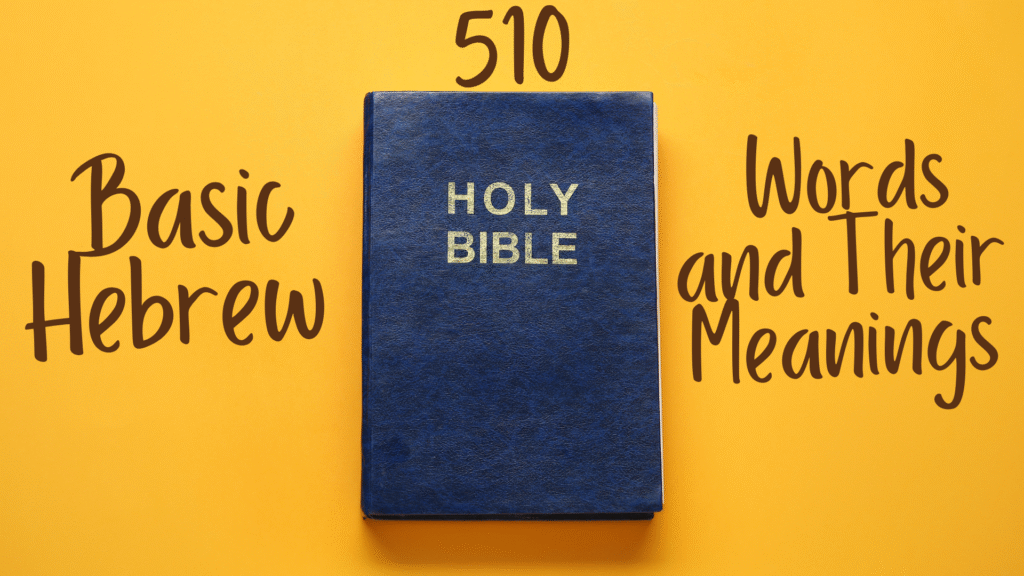
Words Beginning with ת (Tav)
The letter ת (Tav) represents completion and signing:
Tefillah (תפילה) meaning “prayer” derives from a root meaning “to judge” or “to think,” representing thoughtful communication with God.
Torah (תורה) meaning “teachings” or “instruction” represents divine guidance and the foundational texts of Jewish faith and practice.
Tov (טוב) meaning “good” represents divine approval, moral excellence, and beneficial outcomes according to divine standards.
Tsalach (צלח) meaning “prosper” represents success that comes from divine blessing and right living according to Torah principles.
Tsoor (צוּר) meaning “strength” or “rock” represents stability, permanence, and reliable foundation, often used metaphorically for God.
Tzalmavet (צלמות) meaning “shadow of death” represents the darkest and most dangerous circumstances, particularly in Psalm 23.
Tzayit (זית) meaning “olive” represents peace, prosperity, and divine blessing, particularly through the olive branch and oil symbolism.
Tzedakah (צדקה) meaning “acts of righteousness” represents charitable giving and social justice as expressions of divine character.
Tsedeq (צדק) meaning “righteousness” represents conformity to divine standards and moral excellence in character and action.
Tselem (צֶלֶם) meaning “image” represents the divine likeness in which humans were created, establishing human dignity and purpose.
Words Beginning with ו (Vav)
Var (בַר) meaning “pure” represents cleanliness, moral purity, and freedom from contamination or corruption.
Words Beginning with י (Yud) – Additional Terms
Yalad (יָלַד) meaning “to bear young” represents fertility, multiplication, and the continuation of family lines and promises.
Yarey (ירא) meaning “fear” represents reverent awe, respect, and appropriate response to divine majesty and authority.
Yehudi (יהודי) meaning “Jew” represents ethnic and religious identity connected to the tribe of Judah and Jewish faith and practice.
Yerushalayim (יְרוּשָׁלַיִם) meaning “Jerusalem” represents the holy city, the center of Jewish worship, and the ultimate destination of divine purposes.
Yeshua (ישוע) meaning “Jesus” or “salvation” represents deliverance and the hope of divine rescue from sin and death.
Yom Kippur (יוֹם כִּפּוּר) meaning “Day of Atonement” represents the most solemn day in the Jewish calendar, dedicated to repentance and divine forgiveness.
Words Beginning with ז (Zayin)
Zamir (זָמִיר) meaning “song” or “prune” represents both musical praise and agricultural care, showing how Hebrew often connects spiritual and physical realities.
Practical Applications for Hebrew Learning
Understanding these 510 basic Hebrew words and their meanings provides a solid foundation for further Hebrew study. The vocabulary covers essential categories needed for daily communication while introducing learners to the rich cultural significance and spiritual concepts embedded in the Hebrew language.
Effective Study Strategies:
Practice transliteration to become comfortable with Hebrew sounds and pronunciation. Focus on word families that share common roots to understand semantic analysis and linguistic roots. Connect vocabulary to biblical applications and cultural observations to deepen comprehension.
Use spaced repetition techniques to memorize vocabulary systematically. Group words by themes such as family, food, time, and places to create meaningful associations. Practice using words in simple sentences to develop conversational skills.
Integration with Spiritual Study:
For those interested in biblical translations and Hebrew Bible studies, this vocabulary provides access to understanding Old Testament texts in their original language. Many Hebrew meanings carry theological significance that enriches spiritual interpretations and prayer and worship experiences.
Understanding Hebrew helps appreciate the linguistic nuances that shaped Jewish traditions and continue to influence modern Hebrew usage in Israel today. The connection between ancient biblical language and contemporary spoken Hebrew demonstrates the remarkable continuity of Hebrew culture and identity.
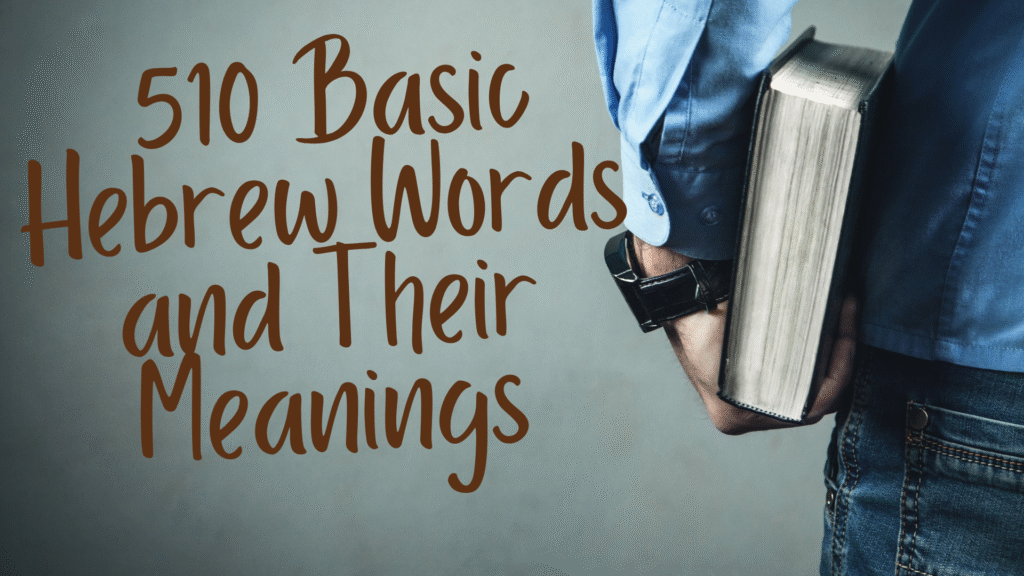
Conclusion
Mastering these 510 basic Hebrew words and their meanings opens pathways to deeper cultural understanding, spiritual growth, and practical communication skills. Whether your interest lies in biblical applications, cultural observations, or modern Israeli society, this foundational Hebrew vocabulary serves as your gateway to a rich linguistic and cultural heritage.
The Hebrew language offers unique insights into concepts of faith and trust, love and compassion, and righteousness and justice that continue to influence Jewish traditions and broader world culture. By understanding Hebrew in its historical context and appreciating its linguistic nuances, learners gain access to thousands of years of wisdom, literature, and spiritual concepts.
Continue your Hebrew learning journey by practicing these words in context, exploring their biblical applications, and connecting with Hebrew-speaking communities. The foundation you’ve built with these essential terms will support more advanced study of Hebrew grammar, literature, and Torah teachings.
Remember that language learning is a gradual process requiring patience and consistent practice. These Hebrew words and phrases represent your first steps toward fluency in one of the world’s most historically significant and spiritually rich languages. Whether you pursue Hebrew for academic, religious, or personal reasons, this vocabulary will serve you well as you explore the depths of Hebrew culture and wisdom.

Catherine Frank, founder of BiblicalHorizon.com, shares daily prayers and Bible verses to nurture spiritual growth. With a lifelong passion for scripture and prayer traditions, she creates accessible spiritual content that resonates with both seasoned believers and newcomers seeking divine connection.

